District, Block-Level Worker-Peasant Protests Against Modi Govt’s Policies
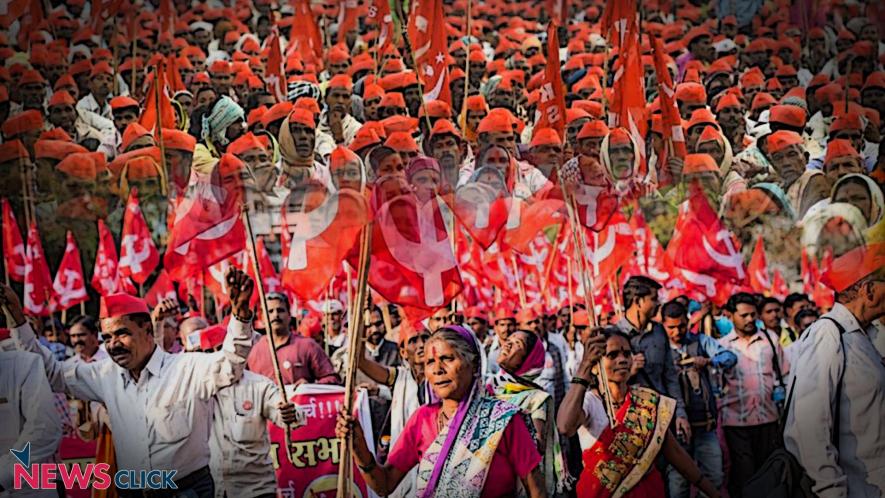
File Photo.
New Delhi: A countrywide joint action day was observed by workers and peasants organisations on Saturday to reiterate their demands for social security benefits, against privatisation, fair price for crops, universal healthcare amid the raging pandemic, among others.
People organised protests in their villages, blocks and districts while adhering to social distancing norms, in a bid to “decentralise” protests in view of the ongoing pandemic.
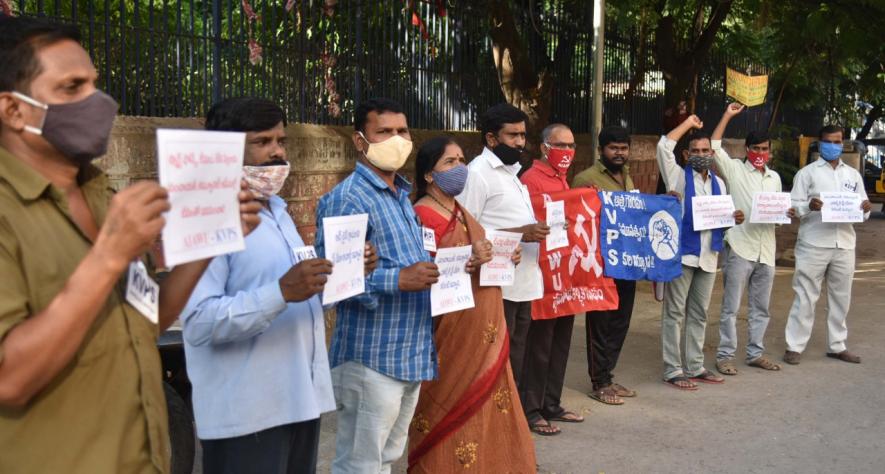
The campaign, called by Centre of Indian Trade Unions (CITU), All India Kisan Sabha (AIKS) and All India Agricultural Workers Union (AIAWU), also coincided with the second anniversary of the “Sangharsh Rally” in 2018.
Almost two lakh workers and peasants had come together for the first time in a joint campaign and had marched to Parliament Street in the national capital.
This year, however, such a massive mobilisation seemed largely impossible due to the surge in COVID-19 cases.
Instead of assembling at one or two places, the mobilisation was “decentralised to hundreds of protest sites”, Tapan Sen, general secretary, CITU, told NewsClick.
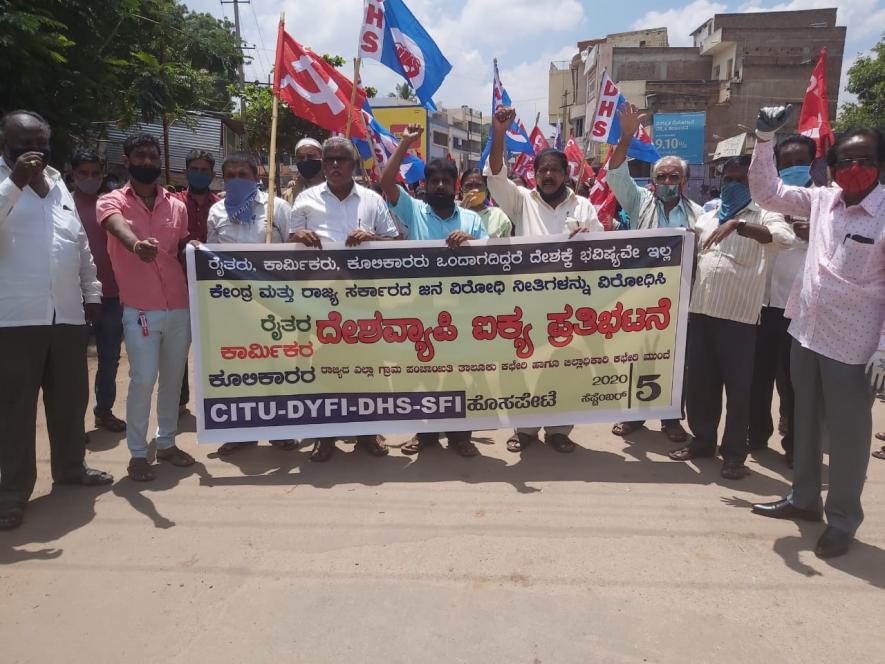
Sen said “decentralisation” of protests ensured greater public participation. “The mobilisation has been consistently increasing over the past months, reflecting the growing anger among the people against the (Narendra) Modi government,” he added.
On Saturday, rallies and public meetings of not more than between 40 and 50 people were organised in states like Maharashtra, Punjab, Telangana, Karnataka, Kerala, Odisha, Andhra Pradesh and Delhi, among others. A major participation of peasants, along with agricultural workers and rural employment scheme (MGNREGA) workers was witnessed in the demonstrations, said the organisers.
In Haryana, scheme workers, including ASHAs, held a protest at the block level. Unions representing tea workers in West Bengal also carried out a rally in districts, including Siliguri.
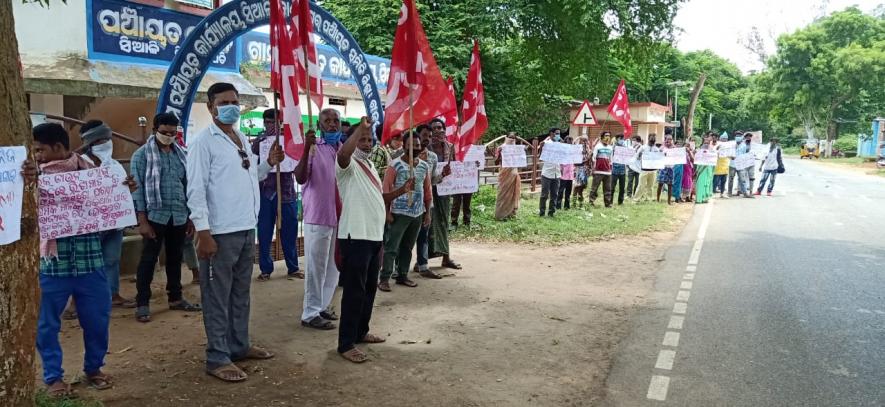
In addition to the local demands, workers and peasants asked for universal healthcare, especially free tests and treatment for COVID-19. In addition, they also demanded an income support of Rs 7,,500 per month for the next six months, along with free ration – all, vouched for earlier by experts and activists as essential steps to help the poor tide over the lockdown-linked economic distress.
The recently released Gross Domestic Product figures for the April-June quarter showed all sectors of the economy, barring agriculture, in bad shape. A dwindling economy also affected the income and savings of the population at large – as multiple reports showed.
However, “even in these dark times for the working population, the government is going ahead with the privatisation of all public companies,” said Vikram Singh of AIAWU, adding that the Centre has also brought in “‘anti-people’ laws and regulations.”
Union Finance Minister Nirmala Sitharaman, had, in the wake of the COVID-19 outbreak, announced a new Public Sector Enterprises Policy in May this year, under which all but a maximum of four public sector companies in strategic sectors were set to get privatised.
While reforms attracting private sector to agriculture marketing have already been effected through ordinances; three codes, out of the total of four which will subsume – and allegedly dilute – the labour laws, are set to be introduced in the Parliament in the upcoming monsoon session.
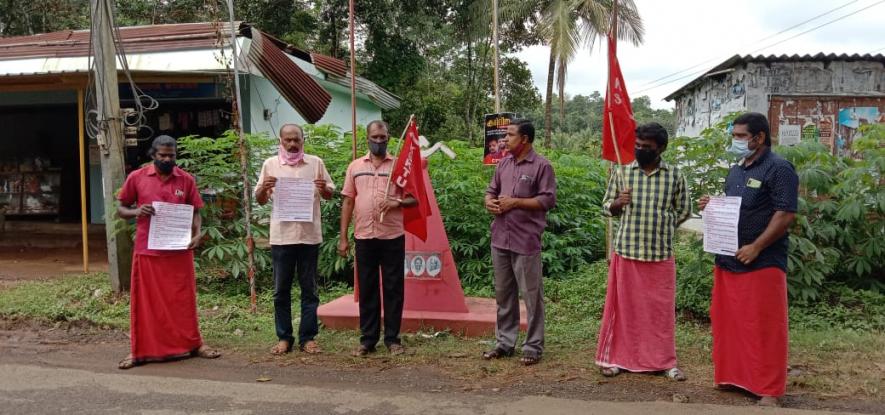
The Modi government is also bringing in structural changes through amendments to laws relating to mining, environment, and health data – regarding which a short window for public consultation, above all, has already the drawn ire of activists.
Singh added that the consequences of all this is that an “insecurity” has seeped into the lives of everyone, including the government employees, informal workers and farmers among others. “A united struggle of the working population will only present an alternative to the destructive politics of the Modi regime,” he said.
Hannan Mollah, general secretary, AIKS, said agriculture under the Bharatiya Janata Party (BJP) government has undergone a shift from being “farmer-oriented to corporate-oriented.” This, he added, has largely been the story of every other sector, where private players, for whom “profit is the ultimate goal”, are being invited.
In an attempt to register its protest, CITU, AIKS, and AIAWU had launched a countrywide joint campaign in the June this year. In August, a jail bharo agitation was staged, which also saw participation from central trade unions.
Sen said the protests would continue in a “much more assertive manner”.
Get the latest reports & analysis with people's perspective on Protests, movements & deep analytical videos, discussions of the current affairs in your Telegram app. Subscribe to NewsClick's Telegram channel & get Real-Time updates on stories, as they get published on our website.























